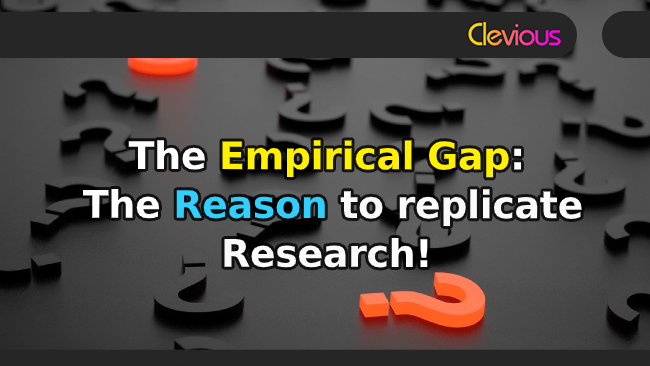In a previous article, titled “How to Come up With a Research Question Easily Like a Pro” I briefly discussed the type of gap that allows you to replicate researches proudly without having to worry about their originality.
In this article, I’m going to discuss it in more detail and explain why it is very important to fill.
What is A Research Gap?
A research gap is generally any problem a scientific article, an academic book or a thesis may contain. In the previous article, based on Dr. Anthony Miles’ article on research gaps, I summarized the 7 research gaps into three main categories: theoretical problems, reasoning problems, and empirical problems.
What is the Empirical Gap?
In human and social sciences, doing research and arriving at a conclusion is a good effort, but it won’t have meaning until it gets tested and verified by other researchers, and that’s what a scientific community is made for: to test and verify each other and help each other progress.
To test and verify researches in different contexts, one should replicate them and see for themselves the results they obtain.
But… you may have already heard from your instructors that your research should be original and by reading these lines you’re maybe wondering whether replicating research is acceptable?
I assure you that indeed it is and that there are several reasons for it.
Why Should We Replicate Researches? – An Example
One of the main rules of science to be science is to allow hypothesis and research statements to be verified by multiple researchers (whether it be soft or hard).
In the context of soft sciences, verification leads most of the time to new results — They are less cumulative than hard sciences — yet it is still a must for the progression of knowledge within.
Karl Popper (1902 – 1994), a prominent philosopher of science, observed that scientific theories are distinguished from those that are not thanks to two criteria: verifiability and falsification:
And that means if you are able to verify and falsify a theory/hypothesis, then you are dealing with scientific theory/hypothesis.
The best example to elucidate this is with the famous example of swans and the claim that “All swans Are White.” — Let’s say some research concluded this.
Is this claim verifiable? — Yes, you can verify the truth or falsity of this claim through observation.
Is it falsifiable? — Yes, nothing prevents you from being critical and nothing stops you from attempting to find at least one instance that proves the falsity of this claim.Can you replicate the research? — Indeed, to verify it and falsify it (Not to Copy it).
Doing so, What’s the difference? What’s new? — A new context, new data are explored.
In fact, If you do some good observation, in the right place and time, you discover that in Australia, black swans exist.
With this very simple example, you should have clearly noticed how important verification and falsifications are for the development of ideas within science: They test theories, engender new ones and test them as well, and so on and so forth.
What does it Mean for You as a Reader?
Newspapers like to report new researches on the spot to get people’s attention and attract more readers, but as a reader, you should resist the news and be careful about basing your opinions on them until you’ll be sure that the research has been verified and confirmed. Simon Oxenham, in a Big Think article about psychology studies, summarizes it this way:
“Whenever you hear the words “new study,” alarm bells should ring. It isn’t new studies that you should base your opinions on; it is old studies that have been replicated again and again, and the results reported in meta-analyses and systematic reviews.”
Summary
In this article, I avoided the vast world that distinguishes hard and soft sciences, qualitative and quantitative research, cumulative and non-cumulative results, inductive and deductive reasoning, hypothetical and non-hypothetical researches, and much more. I based it on a simple example to make it very clear, however, the reality is much more complicated than that and I’m unable to discuss all of it here in a few lines.As you may have noticed, the empirical gap is not something to search for, it is a clear gap that accompanies every research.
Filling it goes through falsification as Karl Popper observed during the demarcation of science and non-science.
All of this is normally more than enough to justify replicating researches for novices that view it as a wrong practice, but it’s totally the opposite.
This is all for the part I of The Reason to Replicate Research,
For Part II, Click Here.
References
Anthony, Miles. “ARTICLE: ‘Research Methods and Strategies Workshop: A Taxonomy of Research Gaps: Identifying and Defining the Seven Research Gaps.’” Researchgate. Accessed January 3, 2020. https://www.researchgate.net/publication/319244623_ARTICLE_Research_Methods_and_Strategies_Workshop_A_Taxonomy_of_Research_Gaps_Identifying_and_Defining_the_Seven_Research_Gaps.
Brendan, Shea. “Karl Popper: Philosophy of Science.” Rochester Community and Technical College, Minnesota Center for Philosophy of Science. Accessed January 3, 2020. https://www.iep.utm.edu/pop-sci/.
Brinton, Crane. “Cumulative and Noncumulative Knowledge.” Journal of Aesthetic Education 18, no. 4 (1984): 78. https://doi.org/10.2307/3332630.
Simon, Oxenham. “Most New Psychology Findings Can’t Be Replicated. So Now What?” Accessed January 3, 2020. https://bigthink.com/neurobonkers/most-new-psychology-findings-cant-be-replicated-now-what.
NB: The references above have been built with a web application called ZoteroBib. For more information, please check the article I wrote about this, titled “How to Cite and Build a Bibliography in Under 10 Minutes!”.

